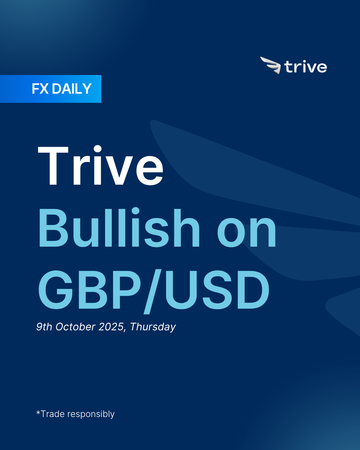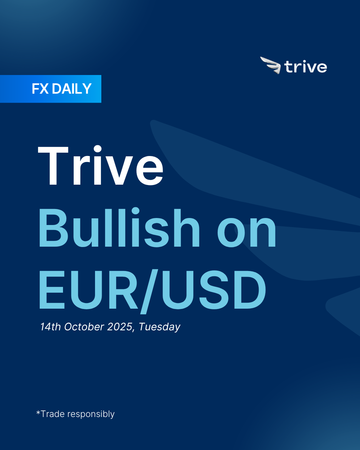FX Weekly: Trive’s Week Ahead Views

This week highlights include minutes from the RBA Minutes, UK Jobs data, US CPI, UK GDP and Australia Jobs data.
Monday
The Reserve Bank of Australia (RBA) will release minutes from its September 30th meeting, where it held the Cash Rate at 3.60%, as expected. The decision was unanimous.
The statement observed that inflation has fallen sharply from 2022 peaks, but the decline in underlying inflation has slowed, and recent data indicate Q3 CPI may exceed earlier forecasts from the August Statement on Monetary Policy.
The RBA reaffirmed its focus on quarterly trimmed mean CPI as the main inflation gauge, while Governor Bullock noted that monthly CPI still provides useful directional insights. The Board judged that risks are now “broadly balanced,” citing upside risks from domestic demand and downside risks if households turn more cautious in response to external pressures.
The Bank stressed it remains “alert to the heightened level of uncertainty” and will adjust its stance as data evolve.
ING interpreted the tone as less dovish, noting that the August CPI surprise reduced the likelihood of a near-term rate cut. The firm said the RBA will need clear evidence of inflation sustainably trending toward the 2.5% midpoint before easing, with the October 29th Q3 CPI release viewed as critical. ING now sees the odds of a November cut as having “diminished meaningfully,” but expects policy will not stay restrictive for long.
Tuesday
The UK unemployment rate for August is expected to hold steady at 4.7%, while average earnings are also projected to remain unchanged at 4.7%. The ex-bonus earnings measure is forecast to ease slightly to 4.7% from 4.8% previously.
The prior report was broadly in line with expectations and indicated a gradually softening labour market, though not enough to alter the Bank of England’s (BoE) broader policy stance. Despite signs of cooling, wage growth remains elevated, sustaining inflationary pressures.
In its most recent policy statement, the Monetary Policy Committee (MPC) noted that there is less immediate risk of a sharp labour market loosening, suggesting a more measured slowdown ahead.
If the upcoming data align with consensus, the release is unlikely to affect near-term BoE policy decisions. Even if the figures signal a faster deterioration in employment conditions, such an outcome would not materially influence the November meeting, where a policy hold is effectively certain.
However, evidence of a deeper labour market slowdown could slightly reinforce the small implied probability of a December rate cut, though markets will look to the Autumn Budget and inflation developments before adjusting expectations further.
Wednesday
The U.S. Bureau of Labor Statistics (BLS) has recalled staff to complete the September Consumer Price Index (CPI) report, which is critical for calculating next year’s Social Security payments, according to Bloomberg. The White House Office of Management and Budget directed this move, targeting publication by the end of October, compared with the original release date of October 15th.
Consensus expectations are for headline CPI to rise +0.3% M/M (previous +0.4%) and core CPI to increase +0.3% M/M (unchanged from the prior month). Citigroup’s forecast aligns with consensus, expecting core CPI up 0.28% M/M in September (vs 0.35% M/M in August). The bank notes that softer housing inflation should offset tariff-driven price pressures, and that weaker labour and housing markets are likely to reduce inflation risks, reinforcing expectations for further Federal Reserve easing.
The FOMC minutes released this week revealed a split among officials: most participants see labour market weakness justifying additional rate cuts, while others highlight lingering inflation risks. Nonetheless, the overall view is that price pressures are easing, and inflation is expected to return to the 2% target over time.
Analysts suggest the divergence stems from differing assessments of whether current policy is already accommodative or if further easing is necessary to support employment. External factors—such as elevated tariffs and the government shutdown, which has disrupted data collection—have added uncertainty, prompting a cautious but generally dovish policy stance. Money markets are currently pricing in 44bps of easing by year-end, implying one fully priced 25bps cut and a high probability of a second, in line with the Fed’s latest projections.
Thursday
There are currently no median forecasts available for September’s Australian labour market report. Westpac expects employment to rise by 15k (previous –5.4k), which would keep the employment-to-population ratio broadly steady near 64%.
The August decline had slowed annual jobs growth to 1.8% Y/Y from 2.5% in February, reflecting a softening trend amid industry rebalancing. Specifically, the “care economy” contribution has halved, while the market sector shows tentative improvement.
The unemployment rate is forecast to edge up to 4.3% (previous 4.2%), with labour force participation expected to hold at 66.8%. Westpac notes that easing cost-of-living pressures and cooling labour demand are contributing to a modest cyclical decline in participation, although longer-term structural trends—such as demographics and flexible work arrangements—are likely to keep participation elevated.
In UK, the July GDP report came broadly in line with expectations for both headline M/M and 3M/3M growth, though the Y/Y figure was slightly softer than consensus and unchanged from the prior level. Within the details, production output contracted, offsetting growth in services and construction, with the manufacturing sector the main drag on performance.
For August, consensus expects GDP to rise 0.2% M/M (previous 0.0%). However, Pantheon Macroeconomics anticipates no growth (0.0% M/M), citing another decline in industrial production driven by a sharp drop in North Sea oil flows. This contrasts with the stronger August PMIs, which suggested improving services activity and a pickup in the composite index, offsetting manufacturing weakness.
S&P Global noted that “economic growth continued to accelerate over the summer,” but September PMIs showed renewed pressure—manufacturing deteriorated, and both services and the composite indices pulled back, pointing to a weaker near-term outlook ahead of the Autumn Budget and amid softening foreign trade.
Overall, the August GDP release is unlikely to alter the BoE’s near-term policy stance, with just 5bps of easing priced in by end-2025. However, if the hard data begins to reflect PMI softness into September and Q4, the probability of a December rate cut could increase, particularly depending on fiscal signals from the Autumn Budget.
In US, The release of September U.S. retail sales is likely to be delayed, though consensus expectations currently look for headline retail sales to rise +0.4% M/M (previous +0.6%) and core retail sales to increase +0.4% M/M (previous +0.7%).
According to Bank of America’s Consumer Checkpoint Report, total credit and debit card spending per household rose +2.0% Y/Y in September (previous +1.7% Y/Y), while seasonally adjusted household spending rose +0.2% M/M (previous +0.4% M/M)—marking the fourth consecutive monthly gain.
Looking ahead to the holiday shopping season, analysts expect slower online sales growth in 2025 amid economic uncertainty.
Disclaimer
This material is provided for informational purposes only and does not constitute financial, investment, or other advice. The opinions expressed in this material are those of the author and do not necessarily reflect the views of Trive International. No opinion contained in this material constitutes a recommendation by Trive International or its author regarding any particular investment, transaction, or investment strategy. This material should not be relied upon in making any investment decision.
The information provided does not consider the individual investment objectives, financial situation, or needs of any specific investor. Investors should seek independent financial advice tailored to their individual circumstances before making any investment decisions. Trive International shall not be liable for any loss, damage, or injury arising directly or indirectly from the use of this information or from any action or decision taken as a result of using this material.
Trive International may or may not have a financial interest in the companies or securities mentioned. The value of investments may fluctuate, and investors may not get back the amount they originally invested. Past performance is not indicative of future results.
For more information about Trive International, please visit http://trive.com/int
Additional Information
Investing involves risk, including the potential loss of principal. Diversification and asset allocation strategies do not ensure a profit or guarantee against loss. The content in this material is subject to change without notice and may become outdated or inaccurate over time. Trive International does not undertake any obligation to update the information in this material.
By accessing this material, you acknowledge and agree to the terms of this disclaimer. If you do not agree with these terms, please refrain from using this information.
No comments
Home
Trive
TriveHub





0 comments